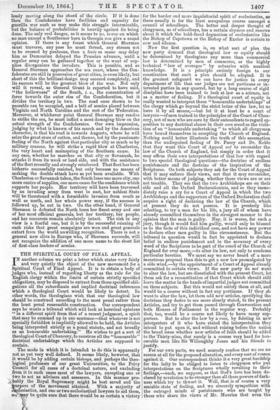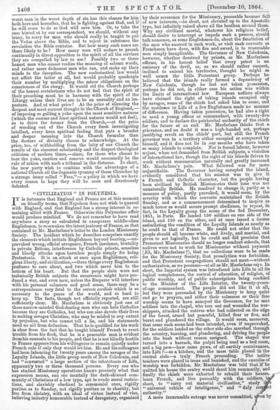THE SPIRITUAL COURT OF FINAL APPEAL.
IN another column we print a letter which states very fairly and very quietly the object of the new movement for a Spiritual Court of Final Appeal. It is to obtain a body of judges who, instead of regarding liberty as the rule for the English clergy within the limits of certain strictly specified obligations, may be disposed to extract from those specified obli- gations all the subordinate and implied doctrinal inferences which a theological Court would be likely to detect. In other words, the theologians wish that our theological law should be construed according to the most penal rather than the least penal reasonable construction. Our correspondent says he wants a tribunal which will look at heretical opinions " in a different spirit from that of a recent judgment, a spirit that may be summed up in one sentence—that whatever is not specially forbidden is implicitly allowed to be held, the Articles being interpreted strictly as a penal statute, and not broadly as an honourable undertaking." He wishes to get a sort of theological Court of Chancery, to construe all the "honourable" doctrinal undertakings which the Articles are supposed to contain.
The mode in which it is intended to do this is apparently not as yet very well defined. It seems likely, however, that it would be by adding certain bishops, and perhaps the theo- logical professors of our great Universities, to the Privy Council for all cases of a doctrinal nature, and excluding from it in such cases most of the lawyers, excepting one or two to act as advisers and assessors. In this manner pro- bably the Royal Supremacy might be best saved and the urpose of the movement attained. With a majority of e desiastics, and one or two ecclesiastical lawyers to aid them, we ..unty be quite sure that there would be as certain a victory for the harder and more inquisitorial spirit of ecclesiastics,. as there usually is for the least scrupulous course amongst a council of schoolboys. The better and deeper thought of clergymen, as of schoolboys, has a certain shyness and reserve about it which the bold-faced dogmatism of ecclesiastics like the Bishop of Capetown or the Bishop of Exeter is certain to cow and silence.
Now the first question is, on what sort of plea the new party demand that theological law or equity should be determined by theologians any more than commercial law is determined by men of commerce, or the highly technical "law of averages" by actuaries with nautical knowledge. It is a principle entirely foreign to our constitution that such a plan should be adopted. It is the greatest safeguard we can have for justice in every department of life that our judges are not partizans or in- terested parties in any quarrel, but by a long course of rigid discipline have been trained to look at law as a science, not as a matter of feeling. If a theological court of equity is really wanted to interpret those "honourable undertakings" of the clergy which go beyond the strict letter of the law, let us have it by all means,—but let it at least be a court of lawyers—of men trained in the principles of the Court of Chan- cery, not of men who are sure by their antecedents to regard op- position to any doctrinal clause in their own creed as the viola- tion of an "honourable undertaking" to which all clergymen have bound themselves in accepting the Church of England. Nothing could better illustrate the truth of this assumption than the undisguised feeling of Dr. Pusey and Dr. Keble that they want this Court of Appeal not to reconsider the law of the Church of England, but simply in order that it may affirm their own interpretations of that law with regard to two special theological questions—the doctrine of endless punishments and the doctrine of the inspiration of the Scriptures. On both subjects they ask for the Court of Appeal that it may enforce their views, not that it may reconsider, with better means of judging, whether those views are or are not tenable. They see that the two Archbishops are on their side and all the Oxford Declarationists, and so they imme- diately raise a cry for a Court of Appeal in which the two Archbishops and the supporters of the Oxford Declaration shall acquire a right of declaring the law of the Church, which at present they do not possess. It is precisely like selecting, to try a man for his life, a jury all of whom have already committed themselves in the strongest manner to the opinion that the man is guilty. Nay, it is worse, for such a jury, though it would find him guilty, would only be biassed as to the facts of this individual case, and not have any power to declare other men guilty in like circumstances. But the tribunal in question would in fact be appointed to declare belief in endless punishment and in the accuracy of every word of the Scriptures to be part of the creed of the Church of England for ever more,—to alter its law, not only to condemn particular heretics. We must say we never heard of a more monstrous proposal than this to get a new law promulgated by a side wind,—by the appointment of a Court of Appeal already committed to certain views. If the new party do not want to alter the law, but are dissatisfied with the present Court, let them ask for a reconstitution of that Court which should still leave the matter in the hands of impartial judges not committed on these subjects. But this would not satisfy them at all, and would be a course without in fact any partizans. If they .do want to alter the law, let them add new articles, specifying the doctrines they desire to see more clearly stated, to the present Articles, and try to get them passed through Convocation and both Houses of Parliament in the regular way. Probably that, too, would be a course not likely to have many sup- porters. But to alter the law by a ruse, by foisting in new interpreters of it who have stated the interpretation they intend to put upon it, and without raising before the nation the broad issue whether new articles of faith should be added to the Thirty-nine, that surely is a course very hard for hon- ourable men like Sir Willoughby Jones and his friends to justify. For our own parts, we need scarcely confess that we see no reason at all for the proposed alteration, and every sort of reason against it. Our correspondent thinks it a very great hardship for the laity to be obliged to listen to clergymen who put interpretations on the Scriptures wholly revolting to their feelings,—such, we suppose, as that God's love has been de- clared by revelation to be stronger than all those powers of dark- ness which try to thwart it. Well, that is of course a very amiable state of feeling, and we sincerely sympathize with the outraged minds of parishioners who are taught by those who share the views of Mr. Maurice that even the worst man in the worst depth of sin has this chance for him both here and hereafter, that he is fighting against God, and if he will cease to do so God will save him. Or, to take the ease hinted at by our correspondent, we should, without any irony, be sorry for men who should really be taught to put the Vedas above the Bible, and to reject in substance the revelation the Bible contains. But how many such cases are there likely to be ? How many men will endure to preach continually in direct opposition to the spirit of all the services they are compelled by law to use ? Possibly two or three honest men who cannot realize the meaning of solemn words, and rather more dishonest men who can, and make up their minds to the deception. The new ecclesiastical law would not affect the latter at all, but would probably quadruple their number by multiplying the minor obligations on the consciences of the clergy. It would rid the Church perhaps of the honest crotcheteers who do not feel that the spirit of their preaching must be in harmony with the spirit of the Liturgy unless their lives are to be an unreality and an im- posture. And at what price? At the price of silencing the deepest and most earnest thought in the Church of England,— of imposing so galling a yoke upon the most sensitive natures (which the coarser and least spiritual natures would not feel), as to drive the former from the Church,--at the price of weeding out of the Church every fresh investigating intellect, every keen spiritual feeling that puts a broader and deeper meaning into the Church formulas than the doctors of divinity choose to acknowledge. At the price, too, of withholding from the laity of our Church the results of the sincerest scholarship and the deepest theological criticism of modern times,—since, for those who choose to bear the yoke, caution and reserve would necessarily be the rule of action with such a tribunal in the distance. In short, the new party wish to combine with the advantages of a national Church all the dogmatic tyranny of those Churches by a strange irony called "Free,"— a policy in which we have every reason to hope they will be soon and disastrously defeated.































 Previous page
Previous page